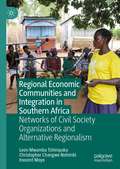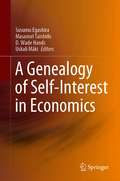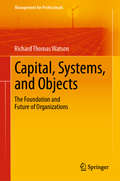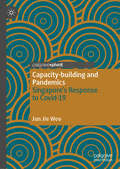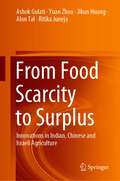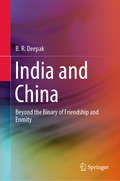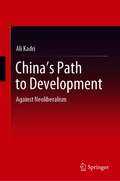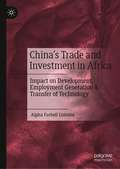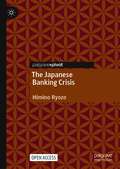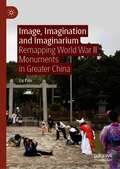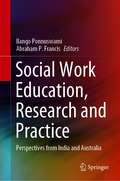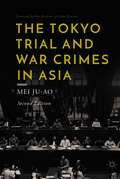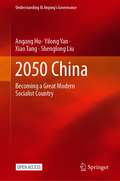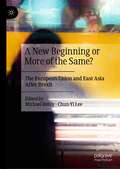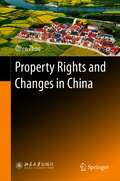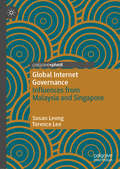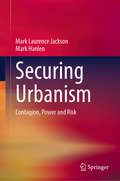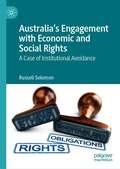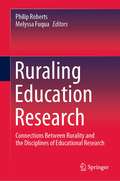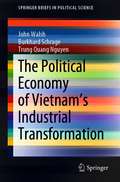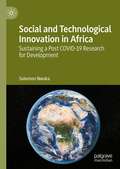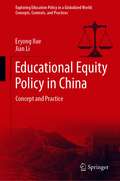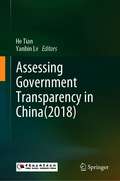- Table View
- List View
Regional Economic Communities and Integration in Southern Africa: Networks of Civil Society Organizations and Alternative Regionalism
by Leon Mwamba Tshimpaka Christopher Changwe Nshimbi Inocent MoyoThis book examines regional integration in Africa, with a particular focus on the Southern African Development Community (SADC). It argues that the SADC’s pursuit of a rationalist and state-centric form of integration for Southern Africa is limited, as it overlooks the contributory role and efficacy of non-state actors, who are relegated to the periphery. The book demonstrates that civil society networks in Southern Africa constitute well-governed, self-organised entities that function just like formal regional arrangements driven by state actors and technocrats. The book amplifies this point by deploying New Institutionalism and the New Regionalism Approach to examine the role and efficacy of non-state actors in building regions from below. The book develops a unique typology that shows how Southern African regional civil society networks adopt strategies, norms and rules to establish an efficient form of alternative integration in the region. Based on a critical analysis of this self-organised regionalism, the book projects the reality that alternative regionalism driven by non-state actors is possible. This book expands the study of regionalism in the SADC, and makes a significant and innovative contribution to the study of contemporary regionalism.
A Genealogy of Self-Interest in Economics
by Susumu Egashira Masanori Taishido D. Wade Hands Uskali MäkiThis is the first book to describe the entire developmental history of the human aspects of economics. The issue of “self-interest” is discussed throughout, from pre-Adam Smith to contemporary neuroeconomics, representing a unique contribution to economics. Though the notion of self-interest has been interpreted in several ways by various schools of economics and economists since Smith first placed it at the heart of the field, this is the first book to focus on this important but overlooked topic. Traditionally, economic theory has presupposed that the core of human behavior is self-interest. Nevertheless, some economists, e.g. recent behavioral economists, have cast doubt on this “self-interested” explanation. Further, though many economists have agreed on the central role of self-interest in economic behavior, each economist’s positioning of self-interest in economic theory differs to some degree. This book helps to elucidate the position of self-interest in economic theory. Given its focus, it is a must-read companion, not only on the history of economic thought but also on economic theory. Furthermore, as today’s capitalism is increasingly causing people to wonder just where self-interest lies, it also appeals to general readers.
Capital, Systems, and Objects: The Foundation and Future of Organizations (Management for Professionals)
by Richard Thomas WatsonThis book provides a set of integrated frameworks—capital, systems, and objects—that transcend managerial or technology hype by focusing on the long-term fundamentals that sustain organizational success. Many organizations are currently addressing two important transformational issues: ecological sustainability and digitization. Sustainability is a goal, an end, and digitization is a process, a means to achieve a goal. This book introduces a flexible model that can be applied to current and future organizational challenges, including sustainability and digitization, because the fundamentals are constant. This book is designed to serve two purposes for the readers: first, to present three conceptual foundations for designing and operating organizations (capital, systems, and objects in Part I); and second, to provide a reference source for implementing these ideas in an organization (Parts II and III). The Part I of the book, chapters 1 through 7, sets forth the conceptual foundations. The chapters mix concepts and practical examples to give a new way of thinking about the setting in which one may work many days each year. The Part II provides details and associated examples of every one of the thirty-six forms of capital conversion. It also illustrates how the five foundational systems support capital conversion in a variety of ways. Finally, the Part III is about measuring capital and systems. The book will resonate with practitioners and students of strategy, leadership, and organizational design. It is critical reading for leaders, industry experts, and general readers who want to understand how over thousands of years the capital creation system has developed today’s world and will fashion its future.
Capacity-building and Pandemics: Singapore’s Response to Covid-19
by Jun Jie WooThis book focuses on the policy capacities, built up since the 2003 SARS crisis, that have contributed to Singapore’s Covid-19 response efforts. In doing so, the book discusses the fiscal, operational, analytical and political capacities that have driven Singapore's policy response to the pandemic, and proposes a broad policy capacity framework that will be applicable to the analysis of other contexts as well. The Covid-19 pandemic has brought about massive disruptions in societies and economies across the world. Singapore’s early success in managing the Covid-19 pandemic has received much attention from researchers and observers from across the world. A study by the T.H. Chan School of Public Health at Harvard University had described Singapore’s early efforts to detect and contain Covid-19 as the “gold standard of near-perfect detection”. Despite its success in containing Covid-19 infections, Singapore has also faced challenges arising from systemic policy blind spots, resulting in high levels of infection in its migrant worker dormitories. With that, the book also discusses the systemic blind spots and policy shortcomings that have emerged in Singapore’s response to the Covid-19 pandemic, and provides policy recommendations on policy capacity-building for future pandemics and crises. The book will be of strong interest to scholars and students of public policy and crisis management, especially those who specialise in healthcare policy and pandemic response. Given the ongoing challenges posed by Covid-19 as well as the continued risks of other future infectious disease outbreaks, the book will also be useful for policymakers and practitioners seeking to draw policy lessons from Singapore’s experience with the SARS and Covid-19 outbreaks.
From Food Scarcity to Surplus: Innovations in Indian, Chinese and Israeli Agriculture
by Ashok Gulati Yuan Zhou Jikun Huang Alon Tal Ritika JunejaThis book brings together unique experiences of India, China and Israel in overcoming economic, social, and natural resource challenges. Through its eleven chapters, the book captures the role of groundbreaking innovations in achieving unprecedented agricultural growth and stabilizing these nations. It provides a future outlook of the new challenges that will confront these countries in 2030 and beyond, related to tackling food and nutrition security, sustainable agricultural growth and adhering to improved food safety standards. This book provides useful insights for exploring technological innovations and policies that can address these future challenges and develop profitable and sustainable agriculture. This volume also highlights valuable lessons that India, China and Israel provide for the rest of the developing world where population is growing fast; natural resources are limited; and it is a challenge to produce enough food, feed and fibre for their populations. Tracing the historical past, this book is an impressive resource for academicians, policymakers, practitioners, agribusiness players, entrepreneurs in understanding the role of innovations in addressing future challenges.
India and China: Beyond the Binary of Friendship and Enmity (G - Reference, Information And Interdisciplinary Subjects Ser.)
by B. R. DeepakThis book examines the changing dynamics of the issues between India and China in the wake of extensive globalisation, economic slowdown, the trade wars, Covid 19, Galwan and the undercurrents in the emerging new global order. Providing a comprehensive overview of India–China relationship and the role of the USA in the context of India’s economic and security cooperation in the region, it argues that India–China relations are too complex to be defined through the binary of friendship and enmity, since it includes an element of cooperation, competition, coordination and as well as conflict and confrontation. The book also opens new avenues for research. As such it is of interest to researchers and students of Asian studies, Asian history, China studies, peace and conflict studies and international relations.
Do Police Need Guns?: Policing and Firearms: Past, Present and Future (Springerbriefs In Criminology Ser.)
by Richard Evans Clare FarmerThis book challenges what are, for many people, deep-rooted expectations regarding the routine arming of police and compares jurisdictions in which police are routinely armed (Toronto, Canada and Brisbane, Australia) and those where police are not routinely armed (Manchester, England and Auckland, New Zealand). With a focus on Western jurisdictions and by examining a range of documentary, media and data sources, this book provides an evidence-based examination of the question: Do police really need guns?This book first provides detailed insight into the armed policing tradition and perceptions/expectations with respect to police and firearms. A range of theoretical concepts regarding policing, state power and the use of force is applied to an examination of what makes the police powerful. This is set against the minimum force tradition, which is typified by policing in England and Wales. Consideration is also given to the role played by key tropes and constructs of popular culture. Drawing on Surette’s model of symbolic reality, the book considers contrasting media traditions and the positioning of firearms within narrative arcs, especially the role of heroes. The book concludes by drawing together the key themes and findings, and considering the viability of retaining and/or moving towards non-routinely armed police.
China's Path to Development: Against Neoliberalism (Springerbriefs In Political Science Ser.)
by Ali KadriThis book is a treatise against neoliberalism illuminated by the path of China. China is a model to be mimicked, but more so theoretically than by replication. If anything, nations of the global South must rid themselves of neoliberally imposed ‘one-size-fits all’ models, instrumentalised to shift value to US empire. Neoliberal models, robbing nations of their histories and resources, are negative ‘best practice’ serving the interests of the hegemon. Developing nations need to search for the theory that corresponds to their own conditions and development strategies. China’s experience, anchored in labour as the historical agent, offers numerous theoretical cues as to how to build comparable home-grown paths. Thinking development with a subject voids reductionist politics in favour of sober class analysis. The study concludes by restating the age-old wisdom that there is no development without the rule of labour.
China’s Trade and Investment in Africa: Impact on Development, Employment Generation & Transfer of Technology
by Alpha Furbell LisimbaThe core argument of this book is that China poses both challenges and creates opportunities for Africa, and that the transformative potentials of China-Africa engagements can be compared to Africa’s experiences with European colonialism. However, it would be patently misleading to claim any equivalence between African experiences of European colonialism with Africa’s engagements with China. Although, China does not replicate the exact colonial model, its actions have all elements of dependent relations, thus underpinning neo-colonialism with Chinese characteristics. Analysing China’s growing economic relations with Africa, this book posits that, Africa’s underdevelopment situation with China does not indicate a significant point of departure from the colonial model of development because China’s actions in Africa, although not exactly colonial, have all possibilities of Neocolonialist model with Chinese characteristics. As such the author argues that China’s increasing trade, FDI inflow and influence on the economic growth and development in Africa will result in a long-term negative impact in development outcomes and capacity building, governance practice, democratic transition and human rights for future self-reliance and sustainable development.
The Japanese Banking Crisis
by Ryozo HiminoThis open access book provides a readable narrative of the bubbles and the banking crisis Japan experienced during the two decades between the late 1980s and the early 2000s. Japan, which was a leading competitor in the world’s manufacturing sector, tried to transform itself into an economy with domestic demand-led mature growth, but the ensuing bubbles and crisis instead made the country suffer from chronicle deflation and stagnation. The book analyses why the Japanese authorities could not avoid making choices that led to this outcome. The chapters are based on the lectures to regulators from emerging economies delivered at the Global Financial Partnership Center of the Financial Services Agency of Japan.
A Chinese Jesuit Catechism: Giulio Aleni’s Four Character Classic 四字經文 (Christianity in Modern China)
by Anthony E. ClarkThis book is the first scholarly study of the famous Jesuit Chinese children’s primer, the Four Character Classic, written by Giulio Aleni (1582–1649) while living in Fujian, China. This book also includes masterful translations of both Wang Yinglin’s (1551–1602) hallowed Confucian Three Character Classic and Aleni’s Chinese catechism that was published during the Qing (1644–1911). Clark’s careful reading of the Four Character Classic provides new insights into an area of the Jesuit mission in early modern China that has so far been given little attention, the education of children. This book underscores how Aleni’s published work functions as a good example of the Jesuit use of normative Chinese print culture to serve the catechetical exigencies of the Catholic mission in East Asia, particularly his meticulous imitation of Confucian children’s primers to promote decidedly Christian content.
Image, Imagination and Imaginarium: Remapping World War II Monuments in Greater China
by Lu PanThis book explores five cases of monument and public commemorative space related to World War II (WWII) in contemporary China (Mainland), Hong Kong and Taiwan, all of which were built either prior to or right after the end of the War and their physical existence still remains. Through the study on the monuments, the project illustrates past and ongoing controversies and contestations over Chinese nation, sovereignty, modernism and identity. Despite their historical affinities, the three societies in question, namely, Mainland China, Hong Kong and Taiwan, vary in their own ways of telling, remembering and forgetting WWII. These divergences are not only rooted in their different political circumstances and social experiences, but also in their current competitions, confrontations and integrations. This book will be of great interest to historians, sinologists and analysts of new Asian nationalism.
Social Work Education, Research and Practice: Perspectives from India and Australia
by Ilango Ponnuswami Abraham P. FrancisThis book addresses a range of key issues concerning social work education, research and practice in India and Australia from a cross-cultural perspective. The respective chapters focus on specific areas of social work regarding e.g. the status and recognition of the profession, regulatory mechanisms, roles and functions of social workers in different settings, and issues and challenges faced by the social work community. The book shares valuable perspectives to help understand the culturally sensitive practice of social work in various socio-cultural, economic and political contexts in both countries. Given the scope of its coverage, the book is of interest to scholars, students and professionals working in the areas of social work, social development and social policy practice.
The Tokyo Trial and War Crimes in Asia
by Mei Ju-aoThe book examines the process and the impact of the International Military Tribunal for the Far East (IMTFE), otherwise known as the Tokyo Trial, which was convened in 1946 to try the Japanese leaders accused of committing war crimes during World War II. Offering valuable research materials, it studies the lessons learned from the failed attempt after World War I, and the background and establishment of the IMTFE. It elaborates on the Charter, the Indictment, the Proceeding Records, and the Judgment of the IMTFE, with an emphasis on principles of international law and other legal questions, often with reference to the Nuremberg Trial. It also discusses the structure and different parts of the court organization, the selection and prosecution of Class-A war criminals, and the trial procedures especially those relating to evidence. The author’s personal experience and his criticism of certain aspects of the Tokyo Trial make it most insightful for the reader. From the perspective of a Chinese judge, this unique text brings in the dimensions of both international law and international relations, and allows us to measure the significance and legacy of the Tokyo Trial for contemporary international criminal justice. The author’s manuscript of this book was written in Chinese in the mid-1960s as part of a larger project, and was initially published in 1988. This is the first time that this book has been translated into English.
2050 China: Becoming a Great Modern Socialist Country (Understanding Xi Jinping’s Governance)
by Angang Hu Yilong Yan Xiao Tang Shenglong LiuThis book is open access under a CC BY-NC-ND 4.0 license.This book is arranged and developed around the theme of “2050 China,” it analyzes the factors and advantages of the Chinese road to socialist modernization, explores and summarizes the development goal and the basic logic of the socialist modernization of China, and further shows the general basis of the primary stage of socialism. According to the report delivered at the 19th Party Congress, and according to the “two-stage” strategic plan, this book looks ahead in detail to the overarching objective and sub-objectives of essentially achieving socialist modernization by 2035, discusses the building of a great modern socialist country in all respects from the perspective of the Party’s six-sphere integrated plan of economic, political, cultural, social, ecological civilization, and national defense construction, and provides policy proposals. This book also analyzes the influence and the effect of the socialist modernization with Chinese characteristics on the world and it further presents the third centenary goal. In conclusion, this book is an elaboration of the work of the Institute for Contemporary China Studies, Tsinghua University. It reflects the intellectual innovation in the authors’ research on contemporary China, as well as the authors’ foresight and predictions about China’s future development.
A New Beginning or More of the Same?: The European Union and East Asia After Brexit
by Michael Reilly Chun-Yi LeeThe EU’s interest in and engagement with North East Asia has grown massively over the last three decades, the shaping and implementation of its policy influenced heavily by the UK and its historical links with East Asia. Brexit therefore raises questions about the future of this engagement and comes against a background of wider threats to the liberal world order, especially rising tensions between the USA and China. Worried that they may be forced to choose sides in their hitherto carefully managed relationships with the two, China’s neighbours are therefore watching with interest to see how the EU and the UK respond and manage their future relations with the region. This book goes beyond the traditional trade links to consider diplomatic and security perspectives, as well as wider issues such as the possible impact on educational and research links. It will be of interest to diplomats, scholars, and economists.
Property Rights and Changes in China
by Qiren ZhouThis book is selection of author’s articles about China’s reform and development. The earliest article of the anthology was written in 1986 and the latest in 2017. The author studies the changes in property rights and system based on the practical experience of China’s reform. In the first article “Economics in the Real World”, the author expounds on Coasean Economics’ Research Method which is “neither fashionable nor popular” and finds out problems from the fascinating real world. It focuses on researching the constraint conditions and strives to have cognition generalized. Guided by this methodology, all the following articles are about empirical research on China’s reform, involving such fields as farmland reform, reform of state-owned enterprises, medical reform, urban-rural relationship, monetary system and regulatory reform. In the concluding article “Institutional Cost and China’s Economy”, the author, gives a new interpretation for the economic logic of the high-speed growth and transformation of China’s economy by redefining concepts. Reading the anthology, readers may not only follow the author’s train of thought to have an overview of the surging and magnificent reform course from small clues to the evident, but also have a broader train of thought on studying and comprehending the practical problems of China.
Global Internet Governance: Influences from Malaysia and Singapore
by Susan Leong Terence LeeThis book addresses the complex issue of global Internet governance by focusing on its implementation in Malaysia and Singapore. The authors draw insights, identify, revisit and flesh out the discourses circulating since the 1990s and pitch them against global internet governance concerns.Internet governance, thought managed domestically/nationally, is a global issue. It is at the heart of how the internet works yet remains hidden within the 'black box' of governance language. While several scholars have entered the fray in recent years, especially in the past decade, very few of them are aware that the Malaysian and Singaporean governments have in fact been at the forefront of Internet regulatory strategies from the early 1990s. The book identifies, revisits and gives flesh to some of the discourses circulating in Southeast Asia at the time and pitches it against current governance concerns. Readers of this book will understand how and why Malaysia and Singapore are important contributors to the issue of internet governance. This knowledge will inform a depth of understanding of why China is keenly seeking to stake its demands on internet governance and sovereignty, and likely American and global responses. Readers will also appreciate how and why the regulation of the Internet has been and will remain a site of contestation and control.
Securing Urbanism: Contagion, Power and Risk
by Mark Laurence Jackson Mark HanlenThis book is concerned with developing an in-depth understanding of contemporary political and spatial analyses of cities. In the three-part development of the book’s overall argument or premise, the reader is taken in Part I through a range of contemporary critical and political understandings of urban securitizing. This is followed by an historical urban landscape of emerging liberalism and neo-liberalism, in nineteenth-century Britain and twentieth-century United States, respectively. These case-study historical chapters enable the introduction of key political issues that are more critically assayed in Parts II and III. With Part II, the reader is introduced in depth to a series of spatial analyses undertaken by Michel Foucault that have been crucial for especially late-twentieth and twenty-first century urban theory and political geography. With Part III the full ramifications of a paradigmatic shift are explored at the level of rethinking territory, population and design. This book is timely and useful for readers who want to develop a stronger understanding of what the book’s researchers term a new political paradigm in urban planning, one ultimately governed by global economic forces that define the end of probability.
Australia’s Engagement with Economic and Social Rights: A Case of Institutional Avoidance
by Russell SolomonThis book is a contemporary socio-legal study of Australia’s protection of economic and social rights. Despite Australia’s hortatory language of compliance with international rights standards, its translation of these standards into domestic law and policy has been found wanting. In considering Australia’s compliance across the policy areas of health, housing, labour and social security, it is argued that Australia’s failings can be understood in terms of its institutional framework. This framework provides incomplete legal protection for rights and leaves that protection almost exclusively in the realm of politics and policymaking, an arena still dominated by neoliberalism and a political culture averse to the protection and promotion of economic and social rights.
Ruraling Education Research: Connections Between Rurality and the Disciplines of Educational Research
by Philip Roberts Melyssa FuquaThis edited volume brings together a collection of chapters from leading scholars in rural education with the purpose of linking knowledge from the rural education field to the wider discipline of education studies. Through addressing significant issues in the rural education field, the book gives insights from rural education that have general relevance for the wider disciplines of education, and provides up-to-date scholarship in research in rural contexts.This book aims to be a definitive and comprehensive edition of contemporary rural education scholarship that works as a guide for those new to researching in and for rural contexts, as well as actively expand the other sub-fields of education from a rural perspective. It examines the connection between rurality and the other domains of educational research, exploring what a rural perspective might bring to the broader fields of educational research, and how it might evolve them. In its unique approach, this book brings the concept of ‘rural’ to the disciplines of education; chapters regarding the ethics of research in the rural context speaks to a gap in rural education, and provide tools for engaging marginalised communities more generally in educational research.
The Political Economy of Vietnam’s Industrial Transformation (SpringerBriefs in Political Science)
by John Walsh Burkhard Schrage Trung Quang NguyenThis book presents an overview of political economic change in Vietnam during a period of significant social and economic change and an era of international turbulence. It combines various political economic perspectives to offer an integrated and comprehensive review of Vietnam’s recent development, discussing topics such as public administrative reform, labour markets and special economic zones, environmental management and other important contemporary issues. This concise and highly readable book includes a considerable amount of research, and as such provides valuable insights for scholars and researchers interested in political economic change and in Vietnam.
Social and Technological Innovation in Africa: Sustaining a Post COVID-19 Research for Development
by Solomon NwakaThis book examines the landscape of sustained investment in research and innovation in Africa, which are critical for development. This cutting-edge analysis is based on empirical evidence and the author’s experience in managing health and related innovations on the continent and globally. It concludes, for the first time, that African innovation is largely driven by the principles of Social, rather than Technological innovation. The significance of this finding and the need to optimize, scale and sustain this dominant innovation is addressed in various chapters that analyze the status, challenges and opportunities. Particularly, the financing, collaboration and coordination patterns for these activities on the continent show a fragmented ecosystem that is largely dependent on external donors and aid. The importance of supportive policies, leadership and venture mechanisms that incentivizes public and private entities to innovate is further exemplified by the lessons of the COVID-19 pandemic. The book proposes mechanism to address identified challenges.
Educational Equity Policy in China: Concept and Practice (Exploring Education Policy in a Globalized World: Concepts, Contexts, and Practices)
by Eryong Xue Jian LiThis book investigates the educational equity in China from multiple perspectives, including rural and urban educational equity, interschool educational equity, Eastern and Western educational equity and administrative policies related to the educational equity. All those perspectives concentrate on examining the comprehensive development of the educational equity in contemporary China. In addition, this book also presents specific historical and cultural shifts for policymakers and stakeholders to offer an in-depth understanding of the educational equity strategy in a long term.
Assessing Government Transparency in China(2018)
by He Tian Yanbin LvThis book, based on empirical and quantitative research, assesses the development of openness in government affairs in China. The content is divided into five parts, namely a general report, special reports, assessment reports on government transparency, reports on the openness of government in specific fields and how openness in government affairs is locally practiced.Covering the country as a whole, the general report summarizes significant aspects of openness in government affairs at all levels regarding, e.g. decision-making, law enforcement, management, service, policy interpretation and responding to public concerns. In addition, the general report reveals some current problems and provides an outline of openness in government affairs for the future. Focusing on decision-making, social assistance, environmental protection, transport, education and other fields closely related to public interest and social attention, the book subsequently summarizes a number of special works concerning openness in government affairs. Furthermore, it conducts a special study on the standardized work of openness in government affairs, which has been actively pursued by departments of the State Council and local governments.In order to provide representative coverage on openness in government affairs, the book combines innovative measures, experiences and problems, while also sharing an in-depth analysis of the difficulties involved in openness for local governments, including examples from several provinces and cities.
